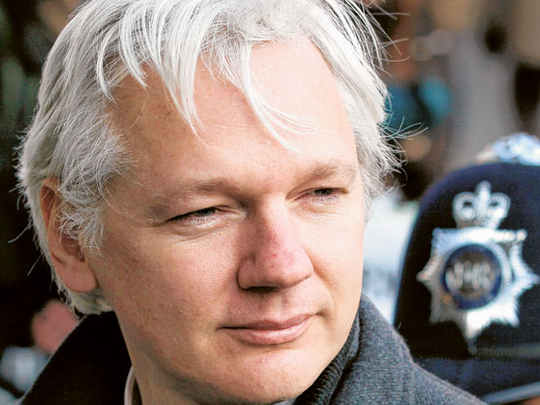
The Julian Assange saga has turned farcical. During his balcony scene on Sunday I half expected the WikiLeaks whistle-blower wanted by Sweden to give his legions of fans, celebrities, media and Harrods shoppers a rendition of ‘Don’t cry for me Ecuador’. The build-up was a nail-biter, especially as someone who exited the embassy revealed Assange planned to give himself up.
Hundreds of stern-faced British Bobbies were in evidence, more than even a mass murderer or war criminal would warrant; they were no doubt frustrated that they couldn’t pluck him from his diplomatically-protected perch. A large crate appeared outside the Ecuadorian embassy marked ‘Diplomatic property of the Republic of Ecuador — Umm…This is NOT Julian Assange’.
Finally, a pale-faced figure emerged eliciting rousing cheers. The main thrust of his 10-minute speech was an attack on the US for “shunting the world into an era of journalistic oppression”. “The United States must renounce its witch-hunt against WikiLeaks,” he said.
There’s a smell of rotten fish around Sweden’s determined bid to have Assange questioned in connection with alleged rape and sexual abuse, a case that had been dropped due to lack of evidence before being re-opened by the Swedish Director of Prosecution. Although Swedish prosecutors have in the past questioned suspects abroad, Assange’s offers to be interviewed in London were rejected.
Consider this. Anti-government whistle-blowers tend to be smeared by accusations of criminality. Former British ambassador to Uzbekistan Craig Murray spilled the beans on torture carried out by CIA proxies and was accused by the Foreign Office of expediting visas for sexual favours; it took him 18 months to clear his name.
Janis Karpinski, a former US Brigadier General complained about abuses in Abu Ghraib and was demoted for allegedly shoplifting for which she was never charged.
Assange is willing to return to Sweden provided he receives a guarantee that he will not be extradited to the US where he could be tried for espionage in connection with WikiLeaks’ release of diplomatic cables gleaned from a US soldier Bradley Manning. No such undertaking has been forthcoming.
US officials are clearly after Assange’s blood. The US Justice Department admits it is investigating while an American grand jury is poised to go. Even the Australian embassy in Washington has been preparing “for the possibility of an extradition” to the US.
Britain’s role is similarly murky. To give this story context, a man who hasn’t been charged with a crime was placed under house arrest for almost two years and forced to incur over a million pounds in legal fees. The possibility of a US extradition order looming in Sweden was of no concern to British judges. Fearing life imprisonment, Assange jumped bail and fled to the tiny Ecuadorian embassy in Knightsbridge where he’s been holed-up for two months awaiting asylum.
On the eve of Ecuador’s decision, last Wednesday, the country’s Foreign Minister Ricardo Patiño could hardly contain his fury as he revealed the contents of a threatening letter, approved by Britain’s Foreign Secretary William Hague. It warned that the UK could use an obscure domestic law to ‘invade’ the Ecuadorian embassy and seize him. “We are not a British colony” was Patino’s answer and, on Thursday, he announced that Assange would, indeed, receive diplomatic asylum.
Hague’s bullying tactics have backfired. The British government now says it won’t storm the embassy, sensible when that would have set a precedent leaving every embassy in the world, including Britain’s, vulnerable.
Too late! A major diplomatic contretemps with most of South America is brewing. Ecuador’s President Rafael Correa is in no mood to let bygones be bygones. “They have not realised that Latin America is free and sovereign and that we’ll not put up with meddling, colonialism of any kind, at least in this country, small, but with a big heart.” Colombia, Argentina, Brazil, Venezuela and Bolivia have come out in his support and others will follow during a special meeting of the Hemispheric Organisation of American States (OAS) to take place in Washington on Friday.
In real terms, little has changed for Assange. Social media is abuzz with people speculating on how he might make his escape. One suggestion is Ecuador could appoint him its envoy to the UN. Assange’s lawyer says the UK is obliged to give him safe conduct under the refugee convention that takes priority over extradition demands or his battle will be taken to the International Court of Justice. I wish him well. Assange did the world a service. US renditions, gulags and torture practices deserve to be exposed. He acted like any journalist worth his salt and, if he’s guilty then so are the Guardian, the New York Times, El Pais, Der Spiegel and Le Monde which all published US embassy cables. It’s a tragedy that the messenger is being targeted while the real criminals, whose names were redacted, get a free pass.
To stop this comedic fiasco Britain could simply let him walk, just as they allowed former president of Chile Augusto Pinochet to do in 2000 rather than extradite him to Spain under an international arrest warrant issued by Judge Baltasar Garzón, who, in a strange twist of fate, is now Mr. Assange’s legal advocate.
Linda S. Heard is a specialist writer on Middle East affairs. She can be contacted at lheard@gulfnews.com










